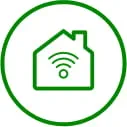When setting up your internet connection, the router you choose can make or break your online experience. It’s the heart of your home network, responsible for delivering reliable and fast connections to all your devices. One question you’ll likely face is whether to buy or lease your router. Let’s look at the factors that can help you decide which option is best for your needs and internet performance.
The importance of router choice for internet performance
A router’s quality directly impacts your internet speed, stability and overall connectivity. Choosing the right router ensures you can enjoy everything your high-speed fiber internet has to offer, whether you’re streaming in 4K, gaming or working remotely.
Overview of buying vs. leasing options
Leasing a router often means paying a monthly fee to your internet service provider (ISP) for the equipment, which comes pre-configured for your service. On the other hand, buying allows you to select a router tailored to your preferences, with a one-time upfront cost. Each choice comes with its pros and cons, which we’ll review in detail.
Why this decision matters for your service
Your choice affects not just your wallet, but also your internet experience. A router that’s incompatible with your internet plan could limit performance, while a poor-quality router might lead to frustrating connectivity issues. Making an informed decision is essential to getting the most out of your service.
Understanding router basics
What a router does
A router connects your devices to the internet and to each other. It manages data traffic, ensuring devices like smartphones, smart TVs, and laptops communicate seamlessly. Without a reliable router, even the fastest internet speeds can feel slow or inconsistent.
How router quality affects internet experience
High-quality routers are equipped to handle more devices, larger data loads, and advanced features like better WiFi range or optimized traffic for gaming and streaming. Older or lower-end routers may bottleneck your speeds and struggle to keep up with modern demands.
Lifespan of typical routers
Most routers have a lifespan of about 3-5 years before they become outdated or start underperforming. Advances in technology, such as new WiFi standards, often make older models less capable over time.
The case for leasing
Convenience factors
Leasing a router from your ISP is simple and hassle-free. The equipment is pre-configured, ensuring compatibility with your service. If you move, you don’t need to worry about setup or compatibility in your new location.
Technical support benefits
Leased routers typically come with customer support. If the router malfunctions or needs replacement, your ISP handles it at no extra cost.
Regular updates
Leasing a router ensures you’ll always have updated firmware, up to date software and dedicated troubleshooting support.
The case for buying
Long-term cost savings
Purchasing a router involves an upfront investment, but it can save you money over time. Within a few years, the purchase cost is often less than the accumulated leasing fees.
Equipment ownership benefits
When you own your router, it’s yours to keep, modify or upgrade as needed. You’re not tied to the ISP’s choices or equipment policies.
Freedom to upgrade on your schedule
Owning your router allows you to upgrade whenever new technology becomes available. You’re not limited by the ISP’s upgrade cycles.
Advanced feature availability
Buying lets you choose a router with advanced features like improved WiFi range, faster speeds or enhanced parental controls, giving you more control over your home network.
Cost comparison analysis
Typical router purchase prices
High-quality routers range from $100 to $300, depending on the features and specifications. Mesh systems for larger homes can cost $300 or more.
Average lease costs over time
With leasing fees averaging $10 per month, you could spend $120 annually. Over 3-5 years, this totals $360-$600, potentially more than the cost of buying a high-performance router.
Hidden costs to consider
While leasing appears cost-effective initially, the fees never stop as long as you’re using the ISP’s equipment. Buying involves an upfront cost, but there are no recurring fees beyond maintenance or upgrades.
Technical considerations
Compatible router specifications
If you buy a router, ensure it’s compatible with your ISP’s service. For fiber internet, look for gigabit-capable routers with support for the latest WiFi standards, such as WiFi 7.
Future-proofing your network
Look for routers with advanced capabilities, such as support for higher speeds and additional frequency bands, to accommodate future upgrades in internet technology.
WiFi standards and updates
WiFi technology evolves quickly. A router supporting the latest standards ensures you’re getting the fastest and most reliable performance.
Security features
Modern routers come with built-in security features, like firewalls and automatic firmware updates, to help protect your home network from threats.
Performance capabilities
High-performance routers can handle multiple devices simultaneously, minimizing lag and improving overall internet experience. This is especially important for smart homes with many connected devices.
The decision to buy or lease your router depends on your priorities. Leasing offers convenience and built-in support, while buying provides long-term savings, ownership and greater control over your network. Carefully evaluate your internet needs, budget and technical requirements to make the best choice for your home. At Ziply Fiber, we’re here to ensure your internet experience is as smooth and reliable as possible, no matter which option you choose.






